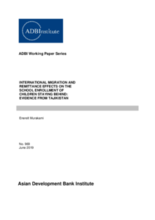Abstract
This paper explores the impact of international migration on school enrollment of children staying behind in Tajikistan, by using data from a large nationally representative household survey. The methodology employed is a switching probit model that accounts for the endogeneity and self-selection of migration and remittance with respect to school enrollment. Counterfactual situations are constructed for children belonging to households with and without migrants, remittance receiving and nonreceiving households, and households with migrant parents to single out the impact of migration and remittances. The results show that migration of household members reduces the probability of enrolling in school by 10 percentage points for children who belong to households with migrants. The effect of parental migration is much larger than that of migration of other household members. Receiving remittances reduces the adverse impact of migration by only 1‒3 percentage points. The effect is especially prominent for poor households with young and uneducated household heads.

